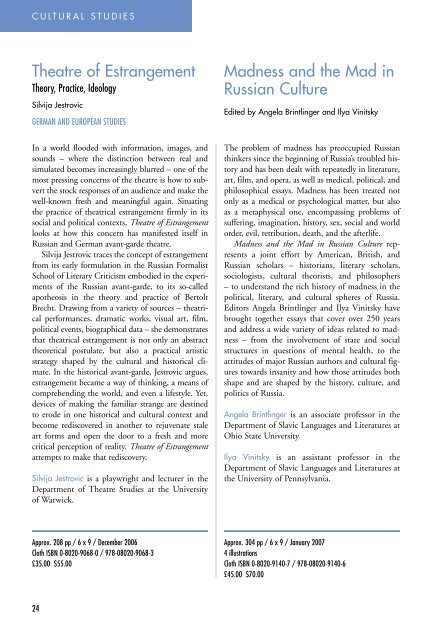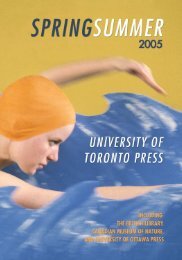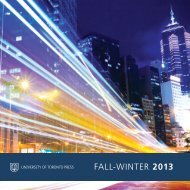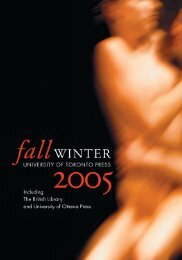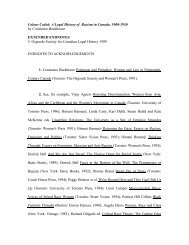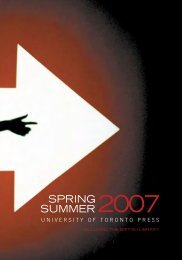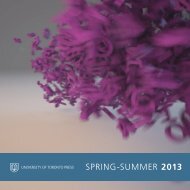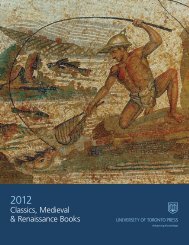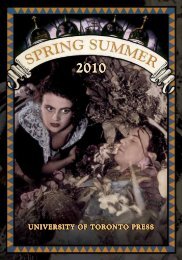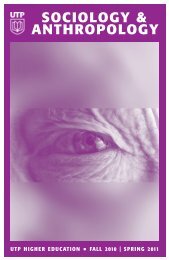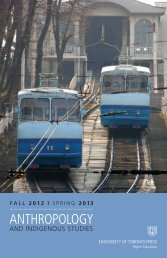Fall/Winter 2006 - University of Toronto Press Publishing
Fall/Winter 2006 - University of Toronto Press Publishing
Fall/Winter 2006 - University of Toronto Press Publishing
Create successful ePaper yourself
Turn your PDF publications into a flip-book with our unique Google optimized e-Paper software.
C U LT U R A L S T U D I E S<br />
Theatre <strong>of</strong> Estrangement<br />
Theory, Practice, Ideology<br />
Silvija Jestrovic<br />
GERMAN AND EUROPEAN STUDIES<br />
In a world flooded with information, images, and<br />
sounds – where the distinction between real and<br />
simulated becomes increasingly blurred – one <strong>of</strong> the<br />
most pressing concerns <strong>of</strong> the theatre is how to subvert<br />
the stock responses <strong>of</strong> an audience and make the<br />
well-known fresh and meaningful again. Situating<br />
the practice <strong>of</strong> theatrical estrangement firmly in its<br />
social and political contexts, Theatre <strong>of</strong> Estrangement<br />
looks at how this concern has manifested itself in<br />
Russian and German avant-garde theatre.<br />
Silvija Jestrovic traces the concept <strong>of</strong> estrangement<br />
from its early formulation in the Russian Formalist<br />
School <strong>of</strong> Literary Criticism embodied in the experiments<br />
<strong>of</strong> the Russian avant-garde, to its so-called<br />
apotheosis in the theory and practice <strong>of</strong> Bertolt<br />
Brecht. Drawing from a variety <strong>of</strong> sources – theatrical<br />
performances, dramatic works, visual art, film,<br />
political events, biographical data – she demonstrates<br />
that theatrical estrangement is not only an abstract<br />
theoretical postulate, but also a practical artistic<br />
strategy shaped by the cultural and historical climate.<br />
In the historical avant-garde, Jestrovic argues,<br />
estrangement became a way <strong>of</strong> thinking, a means <strong>of</strong><br />
comprehending the world, and even a lifestyle. Yet,<br />
devices <strong>of</strong> making the familiar strange are destined<br />
to erode in one historical and cultural context and<br />
become rediscovered in another to rejuvenate stale<br />
art forms and open the door to a fresh and more<br />
critical perception <strong>of</strong> reality. Theatre <strong>of</strong> Estrangement<br />
attempts to make that rediscovery.<br />
Silvija Jestrovic is a playwright and lecturer in the<br />
Department <strong>of</strong> Theatre Studies at the <strong>University</strong><br />
<strong>of</strong> Warwick.<br />
Madness and the Mad in<br />
Russian Culture<br />
Edited by Angela Brintlinger and Ilya Vinitsky<br />
The problem <strong>of</strong> madness has preoccupied Russian<br />
thinkers since the beginning <strong>of</strong> Russia’s troubled history<br />
and has been dealt with repeatedly in literature,<br />
art, film, and opera, as well as medical, political, and<br />
philosophical essays. Madness has been treated not<br />
only as a medical or psychological matter, but also<br />
as a metaphysical one, encompassing problems <strong>of</strong><br />
suffering, imagination, history, sex, social and world<br />
order, evil, retribution, death, and the afterlife.<br />
Madness and the Mad in Russian Culture represents<br />
a joint effort by American, British, and<br />
Russian scholars – historians, literary scholars,<br />
sociologists, cultural theorists, and philosophers<br />
– to understand the rich history <strong>of</strong> madness in the<br />
political, literary, and cultural spheres <strong>of</strong> Russia.<br />
Editors Angela Brintlinger and Ilya Vinitsky have<br />
brought together essays that cover over 250 years<br />
and address a wide variety <strong>of</strong> ideas related to madness<br />
– from the involvement <strong>of</strong> state and social<br />
structures in questions <strong>of</strong> mental health, to the<br />
attitudes <strong>of</strong> major Russian authors and cultural figures<br />
towards insanity and how those attitudes both<br />
shape and are shaped by the history, culture, and<br />
politics <strong>of</strong> Russia.<br />
Angela Brintlinger is an associate pr<strong>of</strong>essor in the<br />
Department <strong>of</strong> Slavic Languages and Literatures at<br />
Ohio State <strong>University</strong><br />
Ilya Vinitsky is an assistant pr<strong>of</strong>essor in the<br />
Department <strong>of</strong> Slavic Languages and Literatures at<br />
the <strong>University</strong> <strong>of</strong> Pennsylvania.<br />
Approx. 208 pp / 6 x 9 / December <strong>2006</strong><br />
Cloth ISBN 0-8020-9068-0 / 978-08020-9068-3<br />
£35.00 $55.00<br />
Approx. 304 pp / 6 x 9 / January 2007<br />
4 illustrations<br />
Cloth ISBN 0-8020-9140-7 / 978-08020-9140-6<br />
£45.00 $70.00<br />
24


